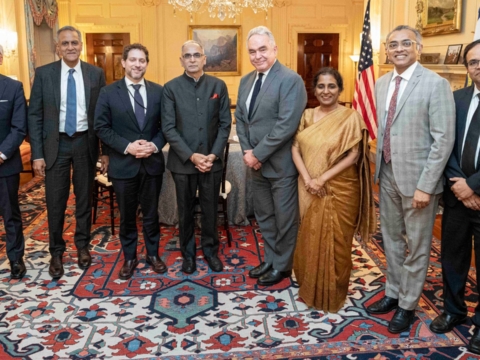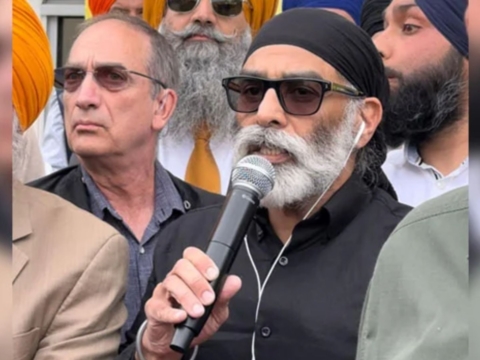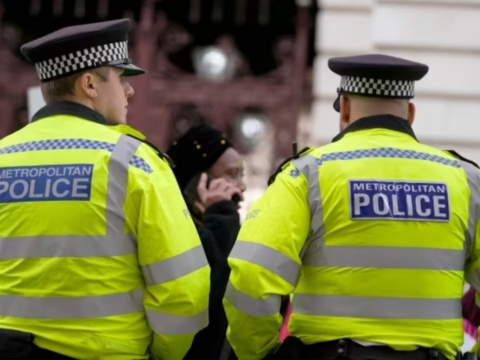NEW DELHI (Diya TV) — The United States continues its engagement with India regarding the alleged involvement of an Indian official in a thwarted plot to assassinate Khalistani leader Gurpatwant Singh Pannun, said US Deputy Secretary of State for Management and Resources, Richard Verma, during a visit to New Delhi this week.
Verma, who served as the US envoy in New Delhi during 2015-17, acknowledged that the Indian side has taken the matter “very seriously” but didn’t go into details. At the same time, he said the overall US-India relationship is “surging forward at a pace and scale” that many people couldn’t have predicted a few years ago.
“We raised our concerns with the government of India. There is a committee of inquiry looking into the matter and we will stay engaged with the government and look forward to their findings. And they’ve taken it very seriously,” Verma said while responding to a question on Pannun at an interactive session at the Observer Research Foundation (ORF).
An indictment filed by US prosecutors in a Manhattan court last November alleged that Indian national Nikhil Gupta, acting on the instructions of an unnamed Indian official, contacted a person whom he believed to be a criminal associate for help in killing Pannun on American soil.
However, the person contacted by Gupta was a confidential source working with US law enforcement. According to the indictment, this source introduced Gupta to a purported hitman, who was an undercover US law enforcement officer. Gupta is currently in jail in the Czech Republic, where a judge is examining his challenge to a court ruling that he can be extradited to the US.
The Indian side has set up a high-level committee to examine inputs provided by the US though nothing has been made public so far about its findings. Pannun, a leader of the banned Sikhs for Justice (SFJ), has already been declared a terrorist by India.
The murder-for-hire case, as the matter has come to be known, has emerged as an irritant in bilateral relations even as India and the US have significantly enhanced cooperation in key areas such as emerging technologies and joint development of military hardware such as engines for the next generation of Indian combat jets.
Verma, who handles management and resources in the US state department and was speaking on the theme “The long view from DC: The India-US partnership”, appreciated the role being played by India in securing the Red Sea following a string of attacks on merchant shipping by Iran-backed militias.
Referring to Iran’s funding and support for proxy groups across the Middle East, Verma said one such group is attacking and damaging commercial vessels on a route critical to the free flow of goods between South Asia and the Middle East and beyond. Such attacks will be “incredibly destabilising” if they are allowed to continue as the “new normal”.
“We appreciate everything India has been doing in the Red Sea with its navy and the incredible support they have provided. I am grateful to all of our US military partners or other coalition partners that have joined Operation Prosperity Guardian and so many other efforts to ensure that shipping lane is open,” he said.
The end goal of the US-India partnership is not the forging of a treaty alliance, the two sides need to enhance trade and security cooperation, and do more in areas such as export control reform, Verma said.
Verma described former US president Bill Clinton’s visit to India in 2000 as a turning point in bilateral ties and listed several figures to demonstrate how the relationship had changed. Bilateral trade has risen from $20 billion in 2000 to $200 billion and sales of defence hardware have increased to $24 billion. The US issued more than one million visas to Indians last year and currently hosts 270,000 Indian students.
Responding to a question on the difference in the positions of India and the US on the Ukraine conflict, Verma referred to a “complicated history” and said the leaders of both countries have called for the protection of territorial integrity, standing up for the rule of law and minimising the humanitarian impact.
“I read a number of different statements and I weave them together, but we have a set of different responsibilities with our NATO partners. We’re differently situated and we are going to continue to do everything we can to defend our friends and partners in Ukraine,” he said.
US-India security cooperation will become more important in the years ahead and building collective capabilities, increasing information-sharing, and improving maritime domain awareness and interoperability will “ensure India continues to be a provider of net security across the Indo-Pacific region and beyond”, Verma said.



